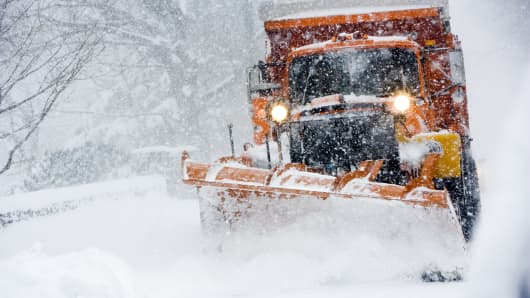Greek cleaner Eleni Daneel's family spends evenings in their Athens home bundled up in coats after a steep rise in fuel prices made heating their apartment an unaffordable luxury this winter.
Daneel is one of a growing number struggling to keep warm after a fuel tax hike aimed at curbing smuggling and boosting revenues for the cash-strapped state sent heating oil prices up 40 percent.
With Greeks already struggling under wage and pension cuts imposed by the foreign lenders that bailed their country out, many have stopped using heating oil altogether, pushing consumption down 70 percent in the last three months of 2012 from a year earlier.
"Some cry, others swear. I've never experienced anything like this before, not being able to keep warm," said Daneel, 57, who supports her unemployed children and bed-ridden husband with her 400-euro monthly salary.
"Why aren't we allowed to live a dignified life?"
Weather in Greece may be milder than in northern Europe, but temperatures still drop below freezing in some coastal areas - a rare snowfall blanketed Athens last month - while mountainous and northern regions are covered in snow through the winter.
Revenues from the tax rose to 120 million euros over the period from 73 million previously, but was a long way short of the 277 million euro government target because of the dramatic drop in consumption.
Finance Minister Yannis Stournaras, however, has refused to row back on the tax hike, saying that aligning heating oil and car fuel taxes eliminates smuggling and that additional revenue for state coffers was secondary.
By harmonizing the taxes, the government eliminated the motive for suppliers to mix cheap heating oil with car fuel and reap huge illegal profits from consumers.
A state fuel subsidy for the poor has gone largely uncollected as apartment building residents who are entitled to the subsidy cannot always convince neighbors who are not entitled to it to buy heating oil for the whole building.
Return of the Athens Smog
Higher fuel prices have helped spawn a set of unintended consequences - from illegal logging for firewood in the countryside to a wood-smoke smog appearing over Athens.
The impact is especially dramatic in the Greek capital, where tenants in both wealthy and poorer neighborhoods have mostly opted not to turn on their apartment buildings' central heating system.
About 95 percent of Athens apartment buildings bought no heating fuel this winter, said Yorgos Giortas, who heads an association of Athens building supervisors. Even the office building where he works, an eight-storey block tenanted by law firms and accountants on a busy street in central Athens, switched off the heating this year to avoid the 2,600 euro monthly oil bill.
"This is the first winter in 32 years that we haven't turned the heating on," Giortas said.
"Now they sit around with their coats on, or use the air-conditioning."
Further away in a residential suburb of Athens, Apostolos Mastouropoulos has turned to his largely decorative fireplace to keep warm. But it is so poorly constructed that most of the smoke fills his apartment.
"I'm outraged," said Mastouropoulos, complaining it would cost 200 euros a month to heat his home with oil but only 40 euros with firewood.
"I'm finding it very hard to adapt to this reality, just because some politicians decided it for us," said Mastouropoulos, whose wife and two adult sons are unemployed.
So dramatic is the surge in the use of wood stoves and poorly functioning fireplaces that a hazy blanket of smog has crept up over the city's skyline, and the smell of ash hangs in the evening air.
The return of the Athens smog - last seen in the 80s and 90s before the state subsidized cars with catalytic converters - has set off alarm bells among environmental groups and officials worried about potential health risks for the public.
Researchers at the National Observatory of Athens said polluting and harmful particles that can cause respiratory problems have reached almost five times the danger level some nights this year.
The smog contains sulfur dioxide, carbon monoxide, and other carcinogens, and was measured at 241 mg per cubic metre on Jan. 9, compared with a danger level of 50 mg.
'Wild West'
For a growing number of Greeks, buying firewood, which can cost 260 euros to get an average household through three months of winter, is difficult, is also more than they can manage, even if it is a quarter of the equivalent heating oil bill.
That has meant a surge in illegal logging in areas like the rugged forest on Mount Egaleo in western Athens, where environmentalists have started patrols in search for offenders.
Clad in bright orange vests, a team of about 15 men, often volunteers, drive jeeps across the mountain, seeking potential loggers and listening for the sound of electric chainsaws.
"Ninety percent of the time it's people who are suffering from the economic crisis who need to keep themselves and their families warm," said Grigoris Gourdomichalis, head of an environmental group run by municipalities.
"I can see where they're coming from. You can't let your small child, or a sick person, or the elderly, go cold," he said, flashing his torchlight on the stumps of three pine trees cut down earlier in the day.
Without powers to arrest, the patrols are largely aimed at preventing illegal felling and can sometimes turn dangerous when loggers turn on the patrollers with knives or guns, he said.
"It's a bit like the Wild West here," Gourdomichalis said. "There's just such poverty and misery and unemployment."



